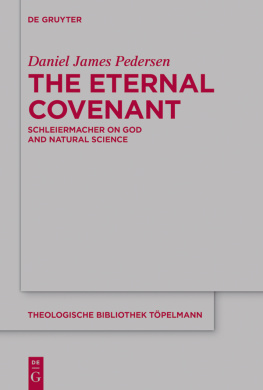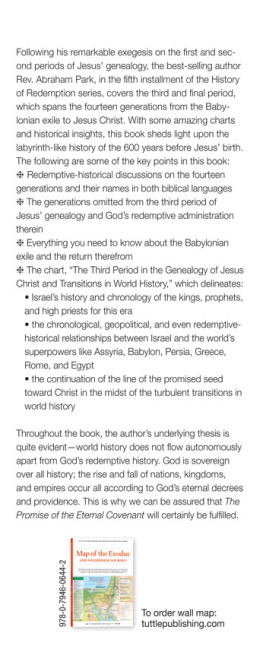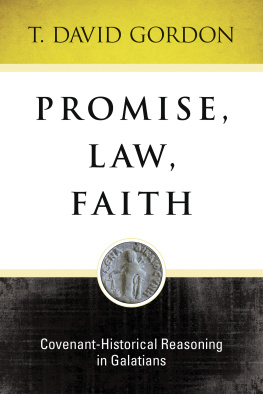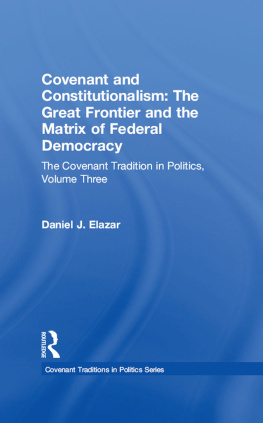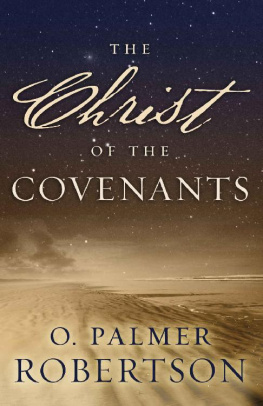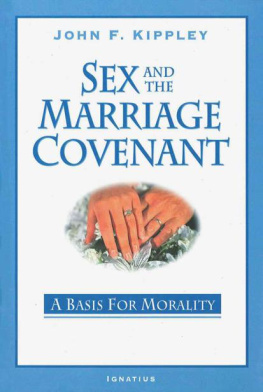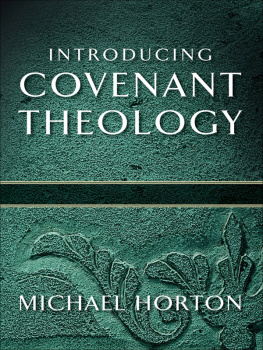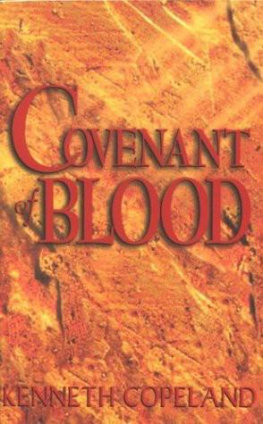Contents
Guide

Daniel James Pedersen
The Eternal Covenant
Theologische Bibliothek
Tpelmann

Herausgegeben von
Bruce McCormack, Friederike Nssel
und Christoph Schwbel
Band 181
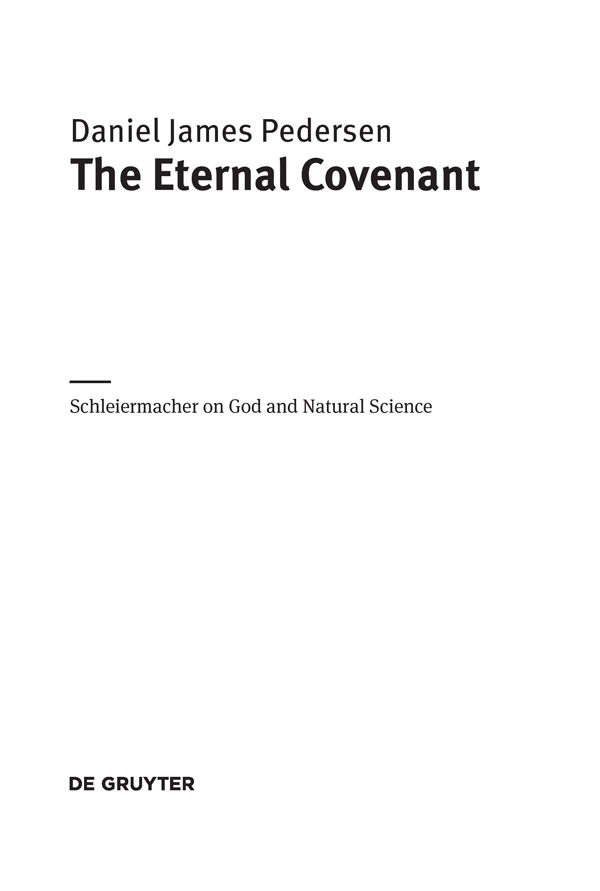
ISBN 978-3-11-054080-2
e-ISBN (PDF) 978-3-11-054230-1
e-ISBN (EPUB) 978-3-11-054128-1
ISSN 0563-4288
Library of Congress Cataloging-in-Publication Data
A CIP catalog record for this book has been applied for at the Library of Congress.
Bibliografische Information der Deutschen Nationalbibliothek
Die Deutsche Nationalbibliothek verzeichnet diese Publikation in der Deutschen Nationalbibliografie; detaillierte bibliografische Daten sind im Internet ber http://dnb.dnb.de abrufbar.
2017 Walter de Gruyter GmbH, Berlin/Boston
www.degruyter.com

For my friends
Acknowledgments
The advice, work, and support of many people contributed to this book. I am so grateful to all of them. I especially want to thank the following friends and colleagues who often went above and beyond to encourage, criticize, and improve this work: Christopher Lilley, Derek Woodard-Lehman, David Chao, Jeffrey Skaff, Bruce McCormack, John Bowlin, Wentzel van Huyssteen, Daniel Garber, and Robert Adams. I am deeply indebted to each of them, as well as to the many people who contributed in smaller ways who remain unnamed.
Most of all, I would like to thank my wife, Danielle, without whose support, encouragement, kindness, and patience this book would simply not have been possible.
Abbreviations
GL Friedrich Schleiermacher, Der christliche Glaube nach den Grundstzen der evangelischen Kirche im Zusammenhange dargestellt . Second edition. Edited by Rolf Schfer. Berlin: Walter de Gruyter, 2008.
Chapter 1Introduction: The Eternal Covenant
All men, Socrates, who have any degree of
right feeling, at the beginning of every
enterprise, whether small or great, call upon
God. And we too, who are going to discourse on
the nature of the universe, how created or how
existing without creation, if we be not
altogether out of our wits, must invoke the aid
of Gods and Goddesses and pray that our words
be acceptable to them and consistent with
themselves.
- Plato, Timaeus
These days it is fashionable to believe, especially in the face of the encroachments of modern science, that there is no freedom without indeterminacy, and no love without indeterminate freedom. This, it is supposed, is as true for God as it is for creatures.
It is remarkable how far this assumption extends. In contemporary conversations on theology-and-science, theorizing a way for God to act within the forces and powers of the natural world, without interrupting them, has become its own cottage industry. are already open. God has elbow room to work, unrestrained by Gods own design. The effort to secure the universe as indeterminate is in part an effort to secure divine freedom of a certain kind, the freedom to act within or upon a world from which, it is assumed, divine activity would otherwise be absent.
The assumption that indeterminacy is a necessary condition of divine freedom is not limited to theology and science specialists. It also permeates much of last centurys work on the doctrine of God. From philosophers of religion to scholars in the recent trinity and election debates, there is a running assumption that indeterminate divine action of the divine essence is as necessary to secure freedom within Gods own life as indeterminacy in nature is to secure free divine interaction with the world. Indeterminate divine action, it is assumed, is the only alternative to compulsion. It is indeterminate divine freedom that makes Gods grace genuinely free, and so, genuinely grace, and it is this free grace, this grace which neednt have been, that secures the love of God as love. For, it is assumed, what you cannot decline to love, you cannot genuinely love. While some theologians worry about divine action being constrained by the world, other theologians worry about divine action being constrained by the divine nature itself.
For more than a century, many theologians and their interlocutors have taken the bait, but it was not always so. In a similar situation, and facing remarkably similar assumptions, Friedrich Schleiermacher gave an account of the Christian faith and its relation to natural science which required none of the indeterminacy which contemporary accounts of many kinds judge essential. On Schleiermachers account, the problem of how to secure divine freedom through indeterminacy, in either the world or in the divine life itself, is a false problem. In fact, he argues the opposite: that the indeterminacy which both advocates and critics judge necessary for God is both incoherent and impious. Indeterminacy is instead an imperfection of the definite action of a definite God: a failure of divine power, divine wisdom, or both. And, in fact, not only are worries over both questions of divine actiondivine intervention vis--vis the world, or indeterminacy vis--vis the divine natureequally problematic, they are problematic in the same way because they are simply two facets of one and the same false problem. Schleiermachers alternative account transcends both at once. And, as an account which explicitly proceeds from piety, it does not admit of dead forces, or blind necessity, and least of all the superfluity of the Supreme Being, but insists instead that criticism of this sort is not only compatible with piety, but necessitated by it. The following chapters unpack each of these claims in turn.
It might sound unbelievable to pair the seemingly disparate problems of such different interests together. It might sound even more unbelievable to promise one and the same solution to all. Yet this is exactly what Schleiermacher himself did when he proposed his eternal covenant between the Christian faith and natural science. What exactly that covenant amounts to, and how exactly it is supported, is the subject of this work. Schleiermachers account, as we will see, is not only the consequence of method, or of obeisance paid to the cultural prestige of natural science, but the result of leveraging commitments shared by both the Christian faith and natural science. For his case, he summons shared principles and deploys philosophical and theological arguments, many of which have not been fully appreciated, and some of which have not even been recognized. The eternal covenant, is the result of this intricate effort.
The Eternal Covenant in the Letters to Lcke
In his open Letters to Lcke , Schleiermacher famously proposed an eternal covenant between the living Christian faith, and completely free, independent, scientific inquiry, so that faith does not hinder science and science does not exclude faith. In itself, this neither amounts to an argument, nor even a clear program. In consequence, a good deal of labor has been devoted to clarifying what Schleiermacher meant when he proposed this eternal covenant, and how what he meant solves the issues at handif it is a solution at all. While there are important insights in each of these interpretations, none are wholly adequate.

